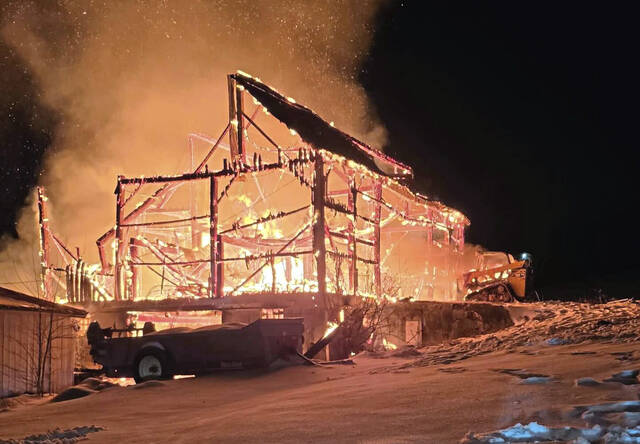The federal Local Food Purchase Assistance program has provided more than $28 million to Pennsylvania farmers since 2022 and delivered nearly 26 million pounds of local produce to food banks and organizations.
The program has helped feed more than 5 million state residents over the past three years, but it appears to be going away, despite funding that already was approved by Congress.
It provides federal subsidies for state, tribal and territorial governments to purchase food produced within the state or within 400 miles of the delivery destination to help support local, regional and underserved producers and shorten supply chains.
In early March, the Trump administration sent a letter to the Pennsylvania Department of Agriculture, notifying it the program’s 2025 agreement was terminated, along with $13 million in congressionally approved funding.
In all, $500 million in Local Food Purchase Assistance funding nationwide has been terminated.
The cuts are part of a wave of federal spending reductions meant to balance the massive cost of extending tax cuts Trump instituted in 2017 and to boost defense and border security spending.
For Westmoreland County farmer Jason Frye, it’s likely going to mean the loss of $100,000 in revenue this year.
“The LFPA program gave us good volume to help us build our business and become a more stable producer in the community,” said Frye, who operates Pleasant Lane Farms in Unity.
Pleasant Lane began participating in the Local Food Purchase Assistance program in the early days of the covid-19 pandemic. Cheese produced on the farm was among the items purchased by the Westmoreland Food Bank.
“The LFPA program allowed us to make our products available to people who otherwise might not be able to access them,” Frye said. “It also gave us some predictability in larger investments and transactions. With the food bank as a partner, we worked out a plan for what we’d send to them, we’d sign purchase orders at the beginning of the year and that led to us being more stable in what we do.”
Loss of food supply
For the Greater Pittsburgh Food Bank, the cuts — combined with large spending reductions in other federal food assistance programs — will mean the loss of 6.3 million pounds of food over the next fiscal year, according to the food bank’s director of government affairs, Colleen Young.
“It’s about 13% of the total food we distribute over the course of the fiscal year,” Young said. “These are also the foods that are in the highest demand: meat, produce, eggs, things that our neighbors who are struggling to afford food have found to be the most costly.”
Jennifer Miller, director at the Westmoreland Food Bank, estimated the food bank would lose out on 2 million pounds of food because of the program cuts.
Tim Hileman, owner of Kistaco Farm Market in Kiski Township, said the loss of program funding is not something that will keep him up at night.
“They’ll come up with the funding someplace else, most likely. They’re not just going to let people go hungry,” he said. “The loss of that funding doesn’t affect my business nearly as much as the deer damage I get each year or the fact that I can’t get anyone to come work.”
Hileman estimated he sold about $50,000 worth of produce last year through the program.
“That’s a big chunk of income, but I can make that up by selling it someplace else,” he said. “I have to worry about the things I can control.”
‘No legal basis’
Pennsylvania Department of Agriculture Secretary Russell Redding said he’s aware of no legal basis for the USDA to terminate the 2025 Local Food Purchase Assistance agreement.
“Rather, it claims, without support, that the agreement ‘no longer effectuates agency priorities,’” Redding wrote in a letter to USDA officials. “Given LFPA’s proven record of helping rural America to thrive and promoting agriculture production that better nourishes Americans, there is no basis for this claim.”
Instead, Redding said, the program termination causes direct harm to farmers and, in turn, to underserved people, the vast majority of whom live in rural counties that supported Trump by large margins in the 2024 election.
The program cuts will affect 190 Pennsylvania farms and 13 regional food banks across the state.
“The loss of that money is going to sting,” said Frye of Pleasant Lane Farms, adding the sudden nature of the termination makes it even harder to absorb. “We’re always aware that these programs can go away, but having it just suddenly disappear is difficult.
“It caught us completely off guard, and it wasn’t one of the gaps I thought I’d need to close in this year’s business plan.”
Frye said the loss could be up to 5% of Pleasant Lane’s annual revenue for year.
“That might not sound like a big figure, but, for a small business, that’s what could make or break you for the year,” he said. “There are a whole lot of small, family-owned farms like us that are going to take a hit because of this.”
Additional cuts
For Pennsylvanians living with food insecurity, the program’s termination comes on the back of Trump administration plans to reduce funding for the Supplemental Nutrition Assistance Program, known as SNAP or food stamps. On May 14, the U.S. House Agriculture Committee approved its portion of Republicans’ major legislative package. It includes a provision that would shift to states some of the responsibility to pay for a major nutrition assistance program.
The bill would require states, for the first time, to cover part of the cost of the assistance program benefits that provide $100 billion per year to help 42 million Americans afford groceries. The measure also would shift more of the administrative cost to states and increase work requirements for recipients. In addition, the Trump administration made severe cuts to The Emergency Food Assistance Program.
Gov. Josh Shapiro said in a radio interview last week that state funds would not be able to make up the shortfall resulting from federal cuts. Shapiro’s proposed budget for next year already was dealt a financial blow when a bill to legalize commercial sales of marijuana died in the Senate.
“The governor needs to find money in the current budget to immediately address this issue, while the Legislature is reviewing and considering our options to address this issue in the upcoming budget,” said Erica Clayton Wright, spokeswoman for state Senate President Pro Tempore Kim Ward, R-Hempfield.
“We are doing what we can to make sure that these programs are solvent, and we are working with the federal government to understand the funding that will support these programs going forward,” she added.
Abby Chiumento, spokesperson for Sen. Elder Vogel, R-New Sewickley, who chairs the Senate’s Agricultural and Rural Affairs Committee, said the funding situation is in flux at the state and federal levels.
“Especially with ongoing (state) budget negotiations as we get into June, a lot of funding aspects are still unknown,” she said. “At the federal level, the governor has gone back and forth with them over canceling this funding, but we don’t have anything definitive yet. And the state also has its own looming budget deficit that we’re working through.”
U.S. Rep. Guy Reschenthaler, R-Peters Township, did not respond to multiple requests for comment.
U.S. Rep. Chris Deluzio, D-Fox Chapel, said now is not the time for these types of cuts.
“I visited a local middle school that uses this federal money to buy locally grown food, and they are really worried about these cuts,” Deluzio said. “We should be supporting programs that support farmers and help put food on the table.”
Young, of the Pittsburgh food bank, said the cuts could not be coming at a worse time.
“Potentially cutting $300 million from the SNAP program is going to create a gap that we can’t make up,” she said. “Combined with potential cuts to Medicaid, people are already struggling with basic needs like food and health care. Now is not the time to cut these types of programs.”
Young added Pittsburgh food bank officials are projecting an increase in clients as federal tariff changes cause grocery prices to rise.
“So we’ll have higher demand, fewer sources of food coming in and threats to these additional federal programs that keep so many people healthy,” she said.








